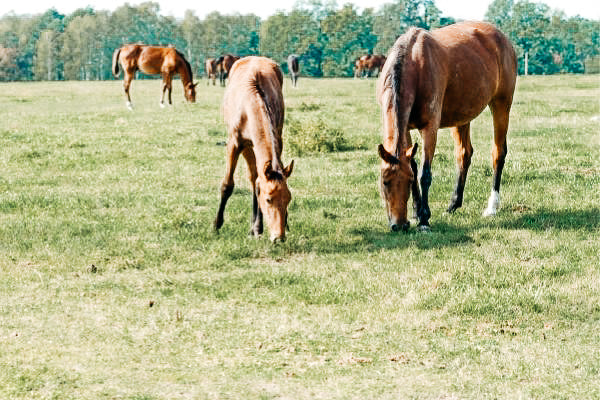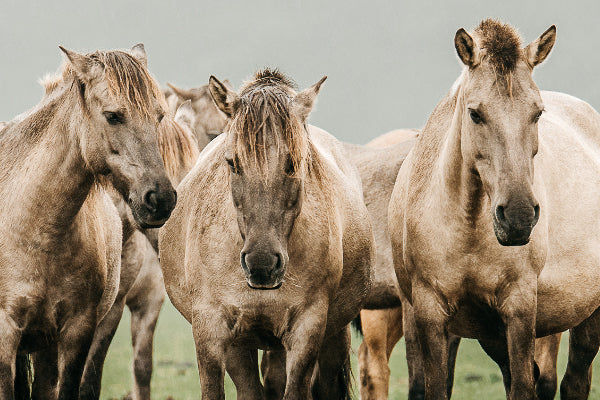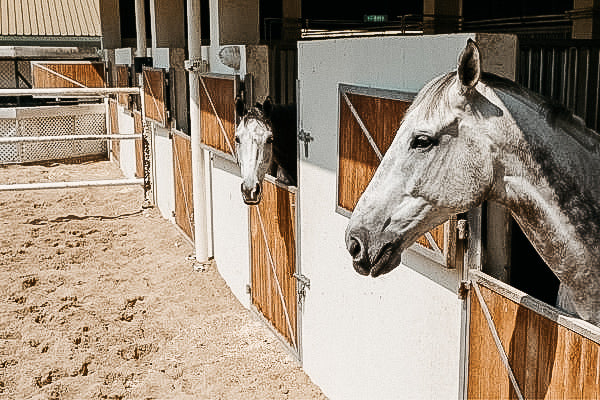Spring is just around the corner. Now it's time to graze. We'll give you the 5 best tips to help you start the grazing season well prepared. The slower the better - it usually takes several weeks to prepare a horse ideally for pasture. Under no circumstances should the habituation period be less than two weeks. The change to grazing season involves a change in feed and therefore means stress for the horses. The change takes place in autumn from grass to hay/juice/concentrated feed and vice versa in spring. Changing feed too quickly can lead to major problems in the horse's digestion. The reason for this is that in spring the grass is particularly rich in protein and carbohydrates.
Some horses tolerate the change very well, while others have major problems with the change in feed. For horses that are at risk of laminitis or colic, you should be particularly careful when grazing and in critical weather conditions you should avoid grazing. In addition, grazing is generally only recommended for these horses every hour.

Why is grazing too quickly so dangerous?
Horses that are robustly kept on pasture all year round slowly and gradually get used to the increasing protein content in the grass. These horses in particular, who have not had the opportunity to eat grass all winter while kept in boxes, cannot properly digest the high protein content in the grass. For this special intestinal bacteria are needed, which only multiply through slow grazing.
The high density of carbohydrates (particularly fructans) can also harm the horse's digestion. Fructans are sugars that are difficult to digest in the horse's small intestine. Too many fuctans in the horse can cause toxins to enter the bloodstream and lead to the dreaded laminitis.
If your horse is not grazed carefully and slowly, an excess of protein can quickly occur. This puts an extreme strain on the horse's metabolism. Here the horse is at risk of colic, laminitis & other metabolic diseases.
The 5 best tips for grazing:
-
1. Find the perfect time:
The nutrient content in the grass increases in spring. The start of the grazing season should depend on the height of the grass. The grass should be at least 20 cm high. This ensures that the horses do not eat a lot of dirt and soil due to grass that is too short, as this can also lead to digestive problems. The grazing season can usually open in mid-April to early May. In addition, the grass loses nutrients over time and is easier to digest.
-
2. Grazing according to plan:
To make the transition to fresh grass easier for your horse, the time in which the horse can graze should be slowly increased. On the first day of grazing, you should only let your horse graze for fifteen minutes. Then you slowly increase the time from day to day. Every other day, the eating time can be increased by a quarter of an hour. Always keep an eye on your horse, as every horse reacts differently. - This allows the horse to gradually get used to the change in feed. If your horse has to stay in the box for a few days while grazing, then unfortunately you will have to start all over again. Only through constant and slow habituation can the horse's digestion get used to the grass.
-
3. Always take it easy, graze slowly:
So that you can start the grazing season stress-free, it is important that you give your horse the time it needs to get used to the grass. The grazing period must under no circumstances be shorter than 2 weeks. The longer your horse has time to adjust, the easier it is on his digestion.
-
4. Before going out to pasture, feed hay:
So that the horses don't rush onto the fresh grass too quickly, you should feed them hay beforehand, not concentrated feed. This reduces hunger and the horse doesn't eat so quickly or greedily. In addition, this can prevent intestinal problems such as diarrhea or colic during grazing.
-
5. During grazing, regular exercise:
Since the fresh grass in the pasture receives significantly more water than hay or straw, you can make grazing easier for your horse if you exercise him regularly. When you move, your horse uses energy and his digestion is stimulated. This reduces the risk of colic or laminitis.





